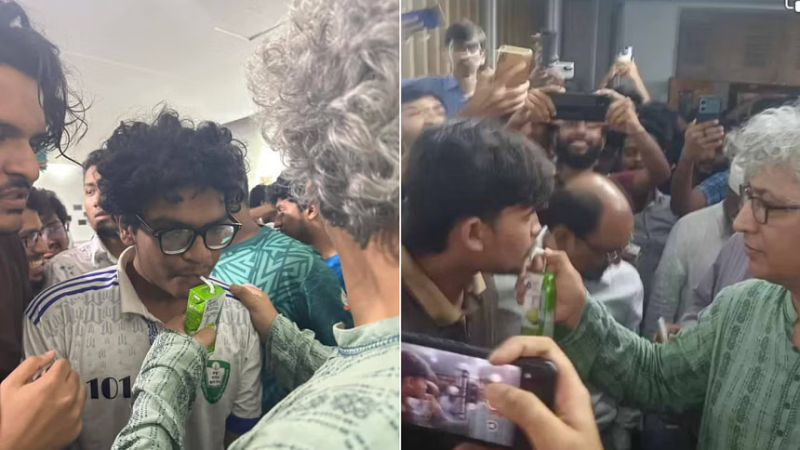- Puppet show enchants Children as Boi Mela comes alive on day 2 |
- DSCC Admin Salam’s drive to make South Dhaka a ‘clean city’ |
- 274 Taliban Dead, 55 Pakistan Troops Killed |
- Now 'open war' with Afghanistan after latest strikes |
- Dhaka's air quality fourth worst in world on Friday morning |
Kuet Students End 57-Hour Hunger Strike After VC's Ouster

Students of Khulna University of Engineering and Technology (Kuet) ended their 57-hour hunger strike early today following the removal of the university's Vice-Chancellor and Pro-Vice-Chancellor.
The students broke their fast after Professor Tanzimuddin Khan, a member of the University Grants Commission (UGC) and a faculty member at Dhaka University, offered them juice at around 1:00am. This marked the end of a tense protest that had begun on Monday afternoon.
Following the announcement, the students took to the campus in a celebratory procession.
Professor Tanzimuddin read out an official message from the Ministry of Education, confirming that the Vice-Chancellor and Pro-Vice-Chancellor had been relieved of their duties in response to the recent unrest, in an effort to restore normal academic activities.
The news sparked joy among the protesters. "We have won. Truth never loses. Inqilab Zindabad! This is not a resignation -- it's a fall from power," one student declared before joining the victory march.
The hunger strike began at 4:00pm on Monday with 32 students. The protest stemmed from a violent clash on campus on February 18, where students alleged that members of a student body and outsiders had attacked them. Despite a police report, no arrests were made, and the counter-complaint from 22 students listed specific details that could only have been obtained with administrative support.
Following the incident, the university suspended 37 students, several of whom are now leading the protests.
Students issued a six-point demand, including the resignation of the Vice-Chancellor, Pro-Vice-Chancellor, and the Director of Student Welfare. On February 23, they submitted their demands to the government. The university responded by suspending academic and administrative activities, and ordered students to vacate the dormitories on February 25.
A three-member investigation committee was formed soon after, but students continued to demand the reopening of the dormitories. After their request was ignored, they spent two nights outdoors before forcibly entering the halls on April 15, only to find that basic services like food, water, and internet were unavailable.

